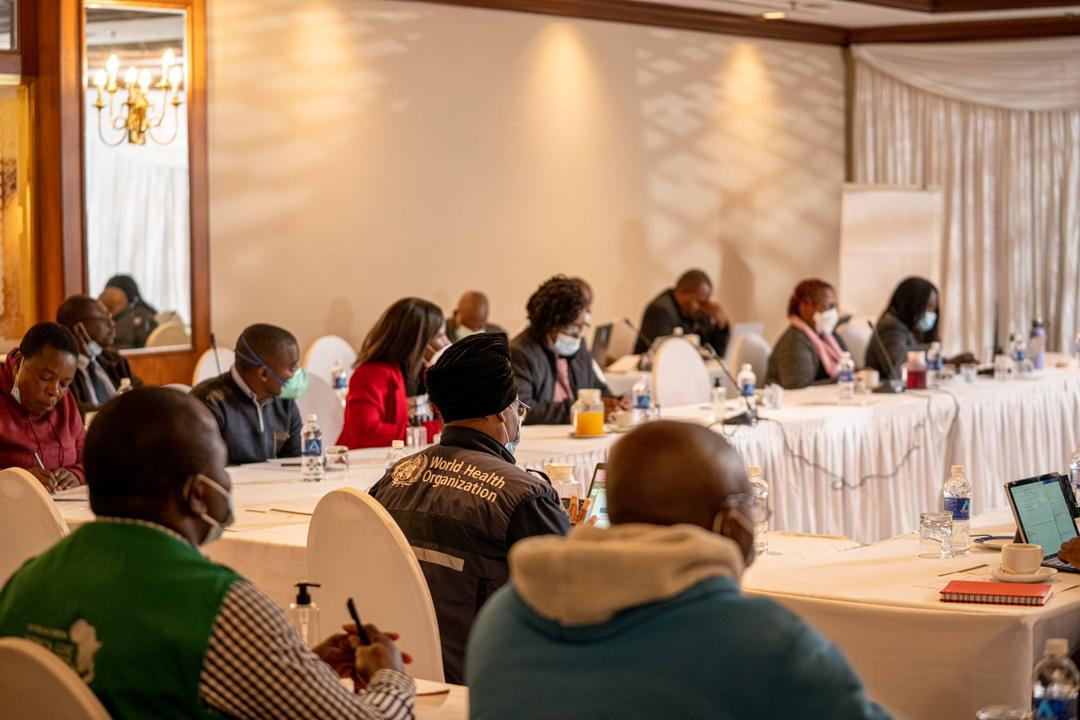At the onset of the mission, the Ministry of Health and Child Care convened a stakeholders meeting
One of the valuable tools in the global, regional, and national response to the COVID-19 pandemic is genomic surveillance. Genomic sequencing is a process used by scientists and public health experts to track the spread of viruses, how the viruses are changing and how those changes may affect public health. Information from genetic surveillance, used together with clinical and epidemiological data, guides the development of vaccines, therapeutics, diagnostic assays as well as decisions on public health and social measures.
Zimbabwe recorded five variants of SARS-Cov-2, the virus that causes COVID-19 since the start of the pandemic, with the Ministry of Health and Child Care (MoHCC) introducing genomic sequencing in May 2021. This was done through repurposing laboratory departments that had hitherto been dedicated to other viral diseases.
To support the ongoing effort to strengthen Zimbabwe’s genomic sequencing capacity, MoHCC, with support from World Health Organization (WHO), conducted a situation analysis of COVID-19 genomic surveillance from 10-19 July 2022. The exercise aimed to identify successes, gaps and challenges faced so far and make recommendations to further strengthen genomic surveillance capacity in Zimbabwe. Furthermore, the visit was also in line with WHO’s ongoing efforts to strengthen genomic surveillance in the African region.
“The visit by WHO/AFRO genomic sequencing experts was welcome and timely as this gave us an opportunity to identify gaps and strengthen our genomic surveillance,” noted Dr Raiva Simbi, MoHCC Laboratory Services Director. “With the recent re-emergence of Marburg virus and monkeypox in the region, it’s important for us to strengthen our sequencing capacity beyond COVID-19 to other diseases.”
At the onset of the mission, the Ministry of Health and Child Care convened a stakeholders meeting during which the WHO/AFRO experts discussed with partners supporting genomic surveillance and other key areas of COVID-19 response in Zimbabwe.
The visit by WHO/AFRO genomic sequencing experts was welcome and timely as this gave us an opportunity to identify gaps and strengthen our genomic surveillance
These partners include the Africa Centers for Disease Control (Africa CDC), the African Institute of Biomedical Science and Technology (AiBST), African Society of Laboratory Medicine (ASLM), Biomedical Research and Training Institute (BRTI), City Health Departments, Clinical Trials Research Center (UZCHS-CTRC), Clinton Health Access Initiative (CHAI) and Cordaid. Also Elizabeth Glaser Paediatric AIDS Foundation (EGPAF), Global Fund (GF), UNICEF, UNDP, US Center for Disease Control (CDC), World Bank and WHO. The meeting was followed by site support visits to four laboratories, which include the National Microbiology Reference Laboratory (NMRL), Beatrice Road Infectious Diseases Hospital laboratory, Mbare Poly Clinic and Upper East Laboratory, a drive through COVID-19 testing clinic.
The visits were done to have an appreciation of available infrastructure as well as understand how the sample referral system and processing works from point of collection to the NRML where genomic sequencing is done. The mission ended with a debriefing meeting where the team presented their findings and recommendations to MoHCC and partners.
The mission appreciated commendable work being done by both the surveillance pillar and the laboratory pillar as well as the strong public-private sector laboratory collaboration.
The mission also noted that Zimbabwe is well capacitated for sequencing and has acquired basic knowledge for sequencing and bioinformatics analysis.
Key recommendations included incorporating genomic surveillance in the national budget to promote sustainability. Partnering with research laboratories and local universities to train and build a workforce with genomic surveillance expertise was also recommended.
Financial support for genomic sequencing through WHO, is being provided by the African Development Bank as well as Health Pool Fund donors that include the European Union and the Foreign, Commonwealth and Development Office (FCDO).
“The mission was an eye opener on all the capacities already established within the country. Zimbabwe has already done a lot to institutionalize genomic surveillance, and to enhance these gains, the country should continue to screen samples for new variants and monitor the population for any outbreaks,” said Rachel Aquilla, WHO AFRO Medical Officer for Laboratory.








OTHER ARTICLES
Editorial — Prevent, inform, and act for women’s health in Africa
Kenya : Government Prioritises Maternal Health and Strengthens Support for Community Health Promoters
Strengthening pandemic prevention, preparedness, and response capacities in Senegal using the “One Health” approach